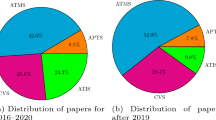Abstract
In this work, we formulate premises of a non-monotonic and distributed logical theory to model the traffic control actions of urban networks. The distributed intelligent agent transaction mechanisms based on distributed default logic are used. We demonstrate the validity of our approach and the contribution of the revisable reasoning formalism and the knowledge representation of multi-agent systems for the problems of traffic congestion management and supervision according to a route or arterial approach. In distributed and collaborative environments, revisable reasoning processes provide necessary facts to activate default rules, which gives the reactive agent the best use of its local and external knowledge. These mechanisms allow the network’s symbolic control system to operate efficiently in a dynamic and hypothetical environment, where basic facts and observations are often problematic.
Access this chapter
Tax calculation will be finalised at checkout
Purchases are for personal use only
Similar content being viewed by others
References
Besnard, P.: An Introduction to Default Logic. Springer, ISBN 978-3-642-08078-4 (1989)
Konolige, K.: On relation between default and autoepistemic logi. Elsevier, Artificial Intelligence (1988)
Reiter R.: A logic for default reasoning. Artif. Intell. (1980) (Special Issue)
Ryzko, D. Rybinski, H., Wiech, P.: Learning mechanism for distributed default logic based MAS – implementation considerations. Intell. Inf. Syst. (2008). ISBN 978-83-60434-44-4
Davis, M.: The mathematics of non-monotonic reasoning. Artif. Intell., vol. 13, (1980) (Special Issue)
De Kleer, J., Mackworth, A.K., Reiter, R.: Characterizing diagnoses and systems. Artif. Intell. (1992)
Reiter R.: Theory of diagnosis from first principles. Artif. Intell. (1987)
Segerberg, K., Meyer, J.L., Kracht, M.: The logic of action. The Stanford Encyclopedia of Philosophy (winter 2013 Edition), Zalta, E.N. (ed.). http://plato.stanford.edu/archives/win2013/entries/logic-action/
Boulmakoul, A., Bourbia, N.: CSN : Contrôle Symbolique par Négociation, prototypage en smalltalk. Software Engineering and its Applications, Paris, France (1994)
Boulmakoul, A.: Approche logique du contrôle symbolique. 9éme Congrés Reconnaissance de Formes et Intelligence Artificielle RFIA’94, vol. 2. Intelligence Artificielle, AFCET, France (1994)
Shoham, Y.: Agent-oriented programming. Artif. Intell. 60(1), 51–92 (1993)
Gul, A.: Actors: A Model of Concurrent Computation in Distributed Systems. The MIT Press series in Artificial Intelligence (1980)
Bajo, J., Hernández, J.Z., Mathieu, P., Campbell, A., Fernández-Caballero, A., Moreno, M.N., ... Botti, V.: Trends in Practical Applications of Agents. Multi-Agent Systems and Sustainability, vol. 372 (2015)
Acknowledgements
This work was partially funded by the Digital Development Agency (ADD) and the National Center for Scientific and Technical Research (CNRST) in partnership with the Ministry of Industry, Commerce and Green and Digital Economy (MICEVN) and the Ministry of National Education, Professional Training, Higher Education and Scientific Research (MENFPESRC)\(\#\) AL KHAWARIZMI Program \(\#\) Intelligent & Resilient Urban Network Defender: A distributed real-time reactive intelligent transportation system for urban traffic congestion symbolic control and monitoring.
Author information
Authors and Affiliations
Editor information
Editors and Affiliations
Rights and permissions
Copyright information
© 2022 The Author(s), under exclusive license to Springer Nature Switzerland AG
About this paper
Cite this paper
Boulmakoul, A., Karim, L., Cherradi, G., Bhushan, B. (2022). Distributed Non-monotonic Reasoning for Transportation Network Congestion Monitoring: Theoretical Foundation. In: Camacho, D., Rosaci, D., Sarné, G.M.L., Versaci, M. (eds) Intelligent Distributed Computing XIV. IDC 2021. Studies in Computational Intelligence, vol 1026. Springer, Cham. https://doi.org/10.1007/978-3-030-96627-0_17
Download citation
DOI: https://doi.org/10.1007/978-3-030-96627-0_17
Published:
Publisher Name: Springer, Cham
Print ISBN: 978-3-030-96626-3
Online ISBN: 978-3-030-96627-0
eBook Packages: Intelligent Technologies and RoboticsIntelligent Technologies and Robotics (R0)




